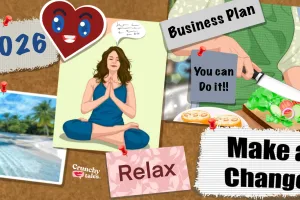Job Hunting Over 50: The Hard Truth and How to Beat It
Job hunting or making a career change is tough at any age, but if you’re over 50 (or any of the euphemisms we like to use such as seasoned, experienced, mature) it’s particularly difficult today. In fact, a recent report from Korn Ferry, the largest executive search firm in the world, claims that Gen X may now be amongst the new “unemployables.“
It’s shocking, but even over 40 can be considered “old” for job seekers. And while it’s unfair, ageism is real, and it’s not going away anytime soon.
Job Hunting Over 50: What You Should Know
These days rules of the job market have shifted. They’re fluid. But here’s the cool part: being older means we no longer have to play by anyone else’s rules.
For reference, I’m in my fifties, too. Alongside being a five-time bestselling author and founder of Advanced Adulting, a platform that helps midlifers navigate life’s next chapter, I’m a former executive recruiter and headhunter. I spent over 15 years placing executives in high-level roles. I’ve been in the rooms where decisions are made—and it’s not always pretty.
I’m here to share with you the good, the bad, and the ugly truths about what really goes on in the hiring process—and more importantly, how you can take control of your job search. I’ll also share some blunt realities that may challenge what you’ve been told about job hunting at this age.
There’s a lot to cover, so buckle up.
#1: The LinkedIn Advice is not enough for job hunting
There’s no shortage of people offering overly simplistic advice on LinkedIn: “Update your skills,” “Refresh your resume,” “Show you can work with other generations.” Sure, that’s the bare minimum, but will thinking that alone make you stand out? That’s delusional. It’s just the price of admission. If nobody sees your application, none of that matters.
#2: A Real Human May Never See Your Resume
Things get tricky here: technology, timing, and sheer volume. When you apply online, there’s a high chance your resume never reaches human eyes. Algorithms filter out applicants that don’t meet specific, and often arbitrary, criteria. If your resume isn’t a spot-on match, you may be out of the running before you even start.
#3: Employers Aren’t Seeing the Bigger Picture
Let’s be real: recruiters and employers are often short-sighted. They aren’t thinking big picture when reviewing your resume. They’re looking for a square peg to fit a square hole, period. It’s not their job (nor do they have the desire) to dig through your resume and see how your experience from three jobs ago might translate into the role they’re trying to fill.
What to do? Connect the dots for them. Spell it out like you’re talking to a third-grader. Too many older job seekers think, “They should see my value and experience.” But it’s not that simple. Employers don’t want to do the work of figuring it out.
#4: Nobody Cares About What You Want
I know this sounds harsh, but hear me out: when it comes to your resume or cover letter, nobody cares about your desire to use your experience in a “collaborative and team-oriented environment.” What they care about is this: What do you do? Where have you done it? How successful were you? And what does that mean for me? Keep it concise and to the point.
In fact, stating exactly THAT should be at the top of your resume, profile, and communication with employers or recruiters.
#5: Ditch the Job Sites and Apps
One of the worst things you can do is rely solely on job postings and apps. The truth is, that many of the best roles are never advertised. Don’t waste your time endlessly scrolling through job boards. Instead, reach out to real humans—people who can say yes. Go straight to decision-makers.
#6: Call Out the Elephant in the Room
Let’s not tiptoe around it: employers are likely thinking about your age. So, address it head-on. Trying to hide it only makes things awkward. Show up with energy, enthusiasm, and experience—but don’t act like age isn’t a factor. It’s better to own it than to let them speculate.
Everyone is thinking it (or they will) and the moment you leave the room or hang up the call, you will NEVER get a chance to make your case. Take control! There are a lot of ways to express the wisdom and experience that come with age in a positive and impactful way. And if they are going to cut you because of it, at least you know YOU gave it your best effort and made your case.
#7: Interviews: Ask the Tough Questions
Don’t just sit there answering questions—ask some yourself. Insightful questions that get to the heart of the matter: Why is this position open? What does success in this role look like? What concerns do you have about hiring someone like me? These questions show that you’re serious, and they shift the conversation from passive to engaging.
#8: Stop Saying You’re a Quick Learner
One of the worst things you can say is, “I’m a quick learner.” Even if it’s true, it makes you sound scattered and unfocused. Instead, focus on showing them the experience and skills you’ve mastered.
#9: It’s Okay to Break the Rules
Don’t be afraid to bypass HR or the recruiter and go straight to someone who has the power to say yes—someone who actually understands what you can bring to the table.
Worried about ruffling feathers? Don’t be. If your resume isn’t going to be seen or considered, you have two choices: follow protocol and risk getting ignored by a low-level HR recruiter or take matters into your own hands.
You’re a grown adult, and nobody will advocate for you better than you will. So, what’s it going to be? Are you going to take control of your career and make things happen, or sit around waiting for someone else to do it for you?
#10: Use Every Tool in the Box
Don’t limit yourself to email alone. Use all the tools, methods, apps and platforms available to reach someone. Some of them can help you find a person’s email, and phone number, and even text them directly. I highly recommend sending DMs on social media, too (though I would skip LinkedIn InMails—they’re not very effective).
Different people respond to different methods. Personally, I’m more likely to respond to a DM than an email. But remember, your goal isn’t to overwhelm them or land the job on the spot—it’s to get noticed and start a conversation, whether they have an opening or not.
#11: It’s About Sparking Interest and Getting a Conversation
Notice I said “conversation” not interview. Your goal isn’t to overwhelm someone with cover letters, resumes, or endless follow-ups. In fact, it’s not even about landing the job right away. Whether they have an opening or not, your purpose is to generate interest and spark a conversation.
An interview may put you in the situation of coming off as needy and sales (and likely to get tossed to HR) while a conversation about what you’ve done successfully and how it may help the company would put you to the same level.
It’s a dance. That’s it. It’s not about a full-on job pitch; it’s about making them curious to learn more about what you can offer. You want to be intriguing enough for them to want to engage with you further.
Bottom Line: Take Control of Your Job Search
If you’re over 50, you’re not out of the game—but the rules are different now. A good resume and posting and praying won’t cut it. To win, you’ll need to break some of those rules, eventually put your mother-guilt and family expectations that hold you back aside, and take control of your narrative.
Don’t rely on job boards, don’t get lost in the shuffle of automated systems, and don’t be afraid to own your age. Show employers that your experience isn’t a liability—it’s your greatest asset.
Like this post? Support Us or Sign up to our newsletter to get more articles like this delivered straight to your inbox!







Let’s be real: job hunting in your 50s isn’t just tough—it’s brutal. Ageism isn’t some myth floating around the ether; it’s alive, kicking, and knocking seasoned professionals out of the running before they’ve even had a chance to make their case. But here’s the thing—whining about it won’t change a damn thing. You’ve got to outsmart it. You’ve got to be smarter and savvier than those outdated algorithms, lazy recruiters, and ageist interviewers. It’s time to stop blending in and start standing out.